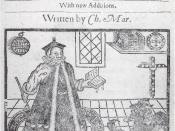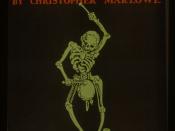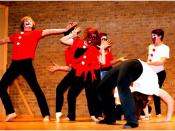Mr. Big Stuff: Hubris in Marlowe's Dr. Faustus Christopher Marlowe, born in 1564, was one of the Renaissance's most celebrated writers writing the epic poem "Hero and Leander" and the poem "The Passionate Shepherd to His Love". However, his didactic play The Tragical History of Dr. Faustus is among one of the most influential plays because of its religious undertone and moral institutes. The main character's. Faustus', tragic flaw is his hubris. Hubris, as defined by William Harmon and C. Hugh Holman, is "Overweening pride or insolence that results in the misfortune of the protagonist of a tragedy..." (254). Moreover, Faustus' hubris leads him to "...break moral law, attempt vainly to transcend limitation...[and] ignore a divine warning with calamitous results" (Harmon and Holman 254).
Faustus breaks moral law by conjuring the Devil in scene three of the play. He, in Latin says, May the gods of the lower regions favor me.
Farewell to the trinity...Prince of the East, Belzebub, monarch or burning hell and Edwards 2 Demogorgon, we pray to you that Mephastophilis May appear and rise.
(Translation of I.iii. 16-19) During this time in the Renaissance, and even presently, to solicit the Devil was definitely an immoral act. Faustus feels that the Devil and his general, Mephastophilis, can be used as vehicles to attain forbidden knowledge. He turns to black magic specifically "...to escape the rational world of knowledge..." (Cheney 101) Faustus finds that his world is "...absent of pleasure and love and...he finds that it imprisons him within a purely mental reality..." (Cheney 102) Seemingly, Faustus is bored with his extremely abundant amount of knowledge. He boasts, longwindedly, of his contributions to medicine and scholarship in scene one.
Having commenced, be a divine in show, Yet level at the end of every art And live and...


